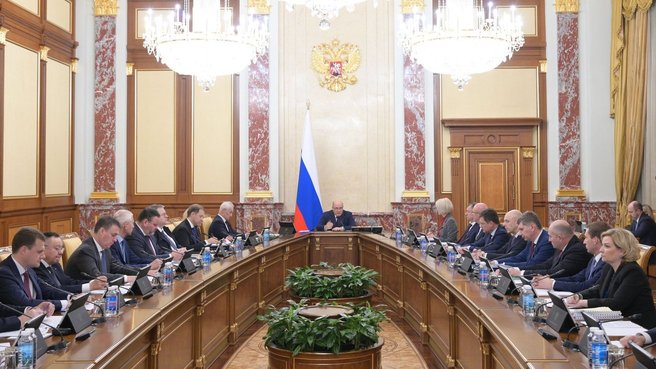The agenda: supporting grain producers and developing agribusiness, preparing housing and utility and power industry enterprises for the heating season.
Mikhail Mishustin’s opening remarks:
Good afternoon, dear colleagues,
Before we begin the Government meeting, I would like to thank the State Duma and the Federation Council, and personally Vyacheslav Volodin and Valentina Matviyenko. Both houses of parliament did a great job in considering and adopting the three-year federal budget submitted by the Government.
It is important that together we managed to ensure the balance of the main financial document amid the ongoing external challenges. Next year, the Government will continue to implement national projects and state programmes to achieve the goals outlined by the President.
The main aspect of our plans is people and improving the quality of their lives. This is an absolute priority of the state. We have repeatedly said this: all social obligations to citizens will be met in full. Special attention will be paid to assistance to families with children, and to healthcare and education development.
Among the key tasks to be solved are strengthening our financial stability and technological sovereignty, as well as building modern infrastructure, including for the integration of the new regions.
Now about the decision made.
The Government is constantly monitoring the situation in our agribusiness, creating stable and attractive conditions for entrepreneurs in this sector.
As the President has noted, the fairly high supply of grain on the world market puts corresponding pressure on prices and affects the future plans of our agricultural producers. This means we need to continue to support them and develop the country’s grain storage infrastructure. In the spring, we allocated 10 billion roubles for these purposes as part of a subsidy to reimburse some of the costs of producing and selling grain, the yields of which remain quite high. Last year was a record one, and this year’s figure is slightly less, this is the second best result, with over 140 million tonnes.
It is important that our assistance is targeted and provided as a priority to those farmers whose incomes are lower than the Russian average, including due to the specific climate, as well as the remoteness of the regions from seaports.
For this, the signed Government Resolution adjusts the approaches to determining the size of interbudgetary transfers. We are also clarifying the calculation procedure and the corresponding coefficients, which will allow us to support more agricultural producers who grow wheat, rye, corn and barley, including also agribusiness in Central Russia, the Volga Region and Siberia.
Given the new rules, we plan to provide them with additional funds, amounting to another 10 billion roubles. We hope that these measures will help preserve cultivation areas and increase our export capacity, which is very important. Also, new jobs will be created in rural areas.
Another item on the agenda of today's Government meeting touches on the development of the agro-industrial sector in two areas at once. First of all, the Government is clarifying and expanding the powers of the Ministry of Agriculture with regard to seed production. The President has repeatedly spoken about the importance of our sovereignty in this area. The availability of domestically produced seeds is one of the key indicators of the Food Security Doctrine. We have recently discussed this at a strategic session.
The new responsibilities of the agency include the approval of the list of subcategories of original agricultural plant seeds, as well as determining the procedure for testing varieties and hybrids that are approved for use in the industry in order to identify economically useful traits and enter data into the relevant state register maintained by the Ministry of Agriculture.
Also seed qualities testing are envisaged and a number of other measures necessary for effective regulation in this area.
In addition, the Ministry of Agriculture will have additional powers to ensure reconstruction and renovation of hydraulic structures used for land reclamation, such as water towers, canals for field drainage or irrigation and other technologies and facilities. This, in turn, helps to increase crop yields and bring more land plots into agriculture.
Thanks to the decisions taken, the ministry will be able to speed up the conclusion of concession agreements, including by reducing the time required to administer such a process.
One more question. An important topic.
Another heating season has begun in Russia. It is long in our country. In many regions, houses are already being supplied with heat, and electricity consumption is increasing.
Today we will discuss how the housing and utilities sector and the energy sector have prepared for this period, whether additional solutions are needed to get through the cold months without disruption and major accidents. The development of many sectors of our economy will depend on coherent action and the smooth operation of all relevant services; and, most importantly, this will affect the quality of life of tens of millions of our people.
In general, preparations for the heating cycle were intensive. The power industry enterprises have accumulated sufficient stocks of resources – even with a significant reserve this year. They exceeded the standards set for diesel fuel by 35 percent and for coal, by 240 percent. The situation is similar in boiler houses that produce heat. There, the stocks of coal and liquid fuel are 30 and 20 percent higher than the standards set, respectively.
The Minister of Energy Nikolai Shulginov and Minister of Construction, Housing and Utilities Irek Faizullin will report on this in more detail today.









